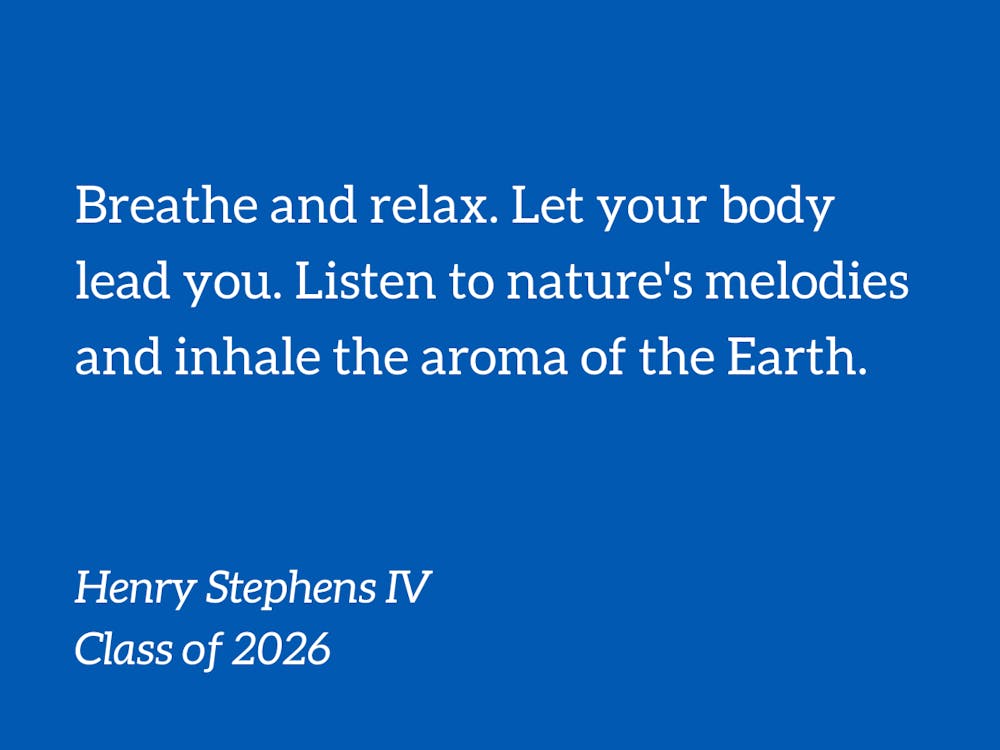The imminent reverberation of your alarm clock inaugurates the sprint to the day’s activities. We pack the buses. We rush to class where we vehemently take notes. We grab an overpriced meal from WU, and then proceed to study tirelessly all while trying to keep our personal lives in balance.
By day’s end, we’re fatigued and possibly contemplating dropping out. We ceaselessly toss our mental baton between academic pursuits and personal endeavors. Ultimately, the demands of the day deprive us of self-care and promote the proliferation of stress.
So, what should we do to relieve stress? We should go out! No, not to Shooters, but outside. To palliate stress and quell our lack of self-nurture, we must connect with nature. Personally, my being is reinvigorated after spending some time outside.
In fact, research reported by the Wall Street Journal’s Betsy Morris states that spending time in nature is coordinated with lower stress hormones. Outdoor time is correlated with lower blood pressure and heart rate. Subsequently, anxiety and depression decrease.
But is this mere correlation or actual causation? Morris reports on a study where a group of men went into the forest for two walks that were both two hours long. Afterwards, they reported decreased cortisol in the blood. Simply put, they were less stressed.
Nature’s power to revitalize our well-being rests in our primitivity. Specifically, our biophilia. This term was coined by renowned environmentalist E.O. Wilson. In Timothy Beatley’s book Biophilic Cities, Beatley defines biophilia as “the extent to which humans are hardwired to need connection with nature and other forms of life.”
In other words, humans possess an innate connection to nature because we evolved in a world that revolved around the environment. Given our primordial connection to nature, it’s unsurprising that the environment can rejuvenate our being.
Hence, I firmly believe that we should harness nature’s scientifically proven restorative properties to mitigate our feelings of stress. How do we do this? We start bathing in the forest. I know this act sounds absurd, but it’s merely a complete immersion of oneself into nature in order to connect with it, thereby attaining its benefits.
Although you probably think forest bathing is a doctrine of hippie culture, it is an ancient Japanese tradition called shinrin-yoku. In his book, Forest Bathing: How Trees Can Help You Find Health and Happiness, expert Dr. Qing Li, describes it as “the art of connecting with nature through our senses.”
Thus, we can achieve stress alleviation from our biological unity to nature which is personified by forest-bathing.
You’re likely wondering where we can go to forest bathe. Look no further than Sarah P. Duke Gardens (it’s my ideal place to forest bathe). Leave anything academic-related behind. Once you’re surrounded by vegetation, immerse yourself into creation. Walk around while employing all five of your senses to guide you. Breathe and relax. Let your body lead you. Listen to nature’s melodies and inhale the aroma of the Earth. Soak in the sensory phenomena that nature creates. Afterwards, you’ll experience an inundation of peace and a surrender of stress.
You will leave restored and better equipped to surmount the hurdles of stress from school, work, or your personal life.
In order to reach this state of bliss, you only need to bathe for 20 minute incriminates. A 2022 study described by Tik Root suggests that we should get at least two hours of nature time per week at minimum intervals of 20-minutes. While the time commitment may seem arduous, we likely spend more time on TikTok.
Forest-bathing is worth the time investment. Morris indicates that its effects last for at least seven days. That’s an entire week of reduced stress and more tranquility.
As the semester comes to an end, I implore you to go out into nature and forest bathe.
By doing so, we will feel restful and less stressed, better equipping us for the sprint of our daily activities. Even more, we will be able to calm down after the tensions of the day’s activities.
Thus, engaging in forest bathing will benefit us mentally and physically.
The science and benefits are clear. It’s up to us to pursue and procure them. Set aside time on your calendar to immerse yourself in nature. Admittedly, I only forest-bathed for a total of 30 minutes last week, but I felt like a new person afterwards. Adopting this new method to cope with stress won’t be easy, but it’s not impossible. We’re all at Duke to get ahead in the world, but we can’t get ahead if we leave our well-being behind.
Henry Stephens IV is a Trinity first-year.
Get The Chronicle straight to your inbox
Signup for our weekly newsletter. Cancel at any time.

